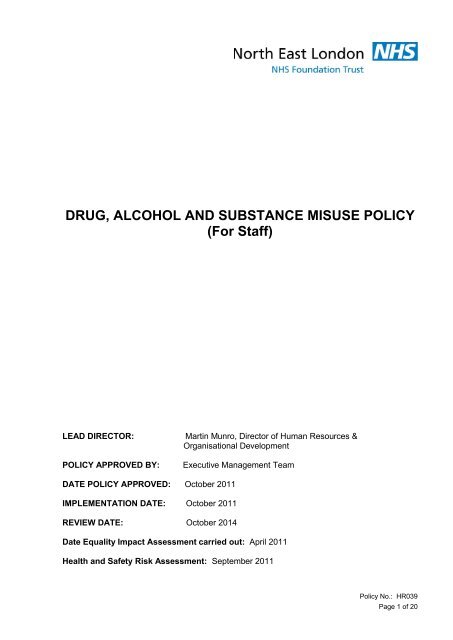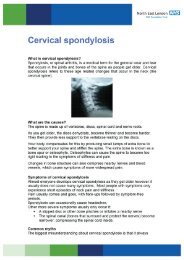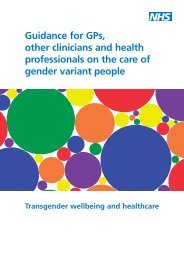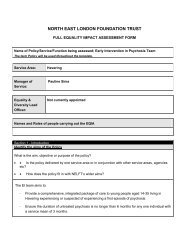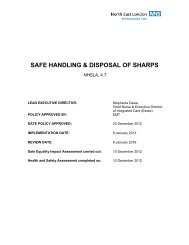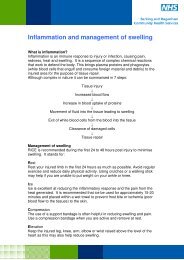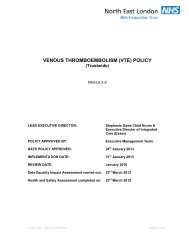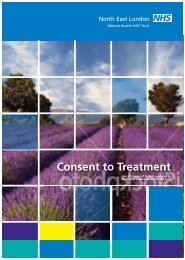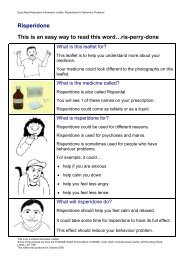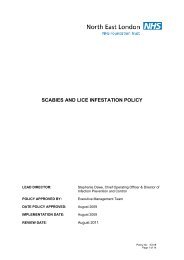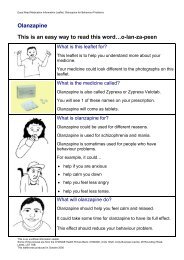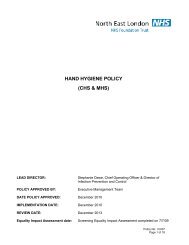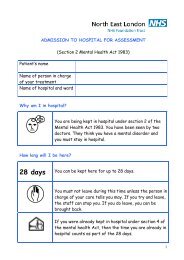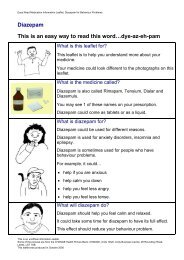DRUG, ALCOHOL AND SUBSTANCE MISUSE POLICY - North East ...
DRUG, ALCOHOL AND SUBSTANCE MISUSE POLICY - North East ...
DRUG, ALCOHOL AND SUBSTANCE MISUSE POLICY - North East ...
- No tags were found...
You also want an ePaper? Increase the reach of your titles
YUMPU automatically turns print PDFs into web optimized ePapers that Google loves.
• LANGUAGE CONTENT MAP •Module OneHere I amModule TwoMore about meWelcome UnitThe magic gardenUnit 1Autumn is hereUnit 2Winter is hereUnit 3Spring is hereUnit 4Summer is hereActive language Passive language Common European Frameworkof Reference‘can do’ statementsNames of animalsWhat’s your name?How are you?Good morning.Good night.I can say my name.I can ask you your name.I can greet somebody.Numbers 1 - 10Happy Birthday!How old are you?I’m (age).Thank you!You’re welcome!I’m... (years old).I can say my age.I can ask you your age.ColoursExcuse me!What colour is it?It’s + colourWhat’s your favouritecolour?My favourite colour is...I can ask what colour something is.I can say what colour something is.I can ask you what your favouritecolour is.Names of toysWhat is it?It’s a...I’m sorry.My favourite toy is...Turn round, touch theground, Show your shoe,sit down, stand upup – downI can identify objects.I can ask for identification ofobjects.I can say what my favourite toy is.Parts of the body and faceBless you!I’ve got...I can describe myself.Teacher’s Book • 3 •
ASSURANCE STATEMENTThe purpose of this policy is to explain the responsibilities and principles behind the Trust’sapproach to managing the misuse of drugs, alcohol and other substances by employees. TheTrust aims to ensure that it provides a safe and productive work environment that promotes thehealth, safety and well-being of staff.1. Introduction1.1 Employers have a general duty under the Health & Safety at Work Act 1974 to ensure,as far as is reasonably practicable, the health, safety and welfare of its staff and others.Staff also have a duty to co-operate with and implement their employer’s policies in thisrespect.1.2 It is an offence under the Misuse of Drugs Act 1971 for an employer to allow itspremises to be used for the production or supply of controlled drugs and reasonableaction to prevent this should be taken.1.3 This policy sets out the principles for managing issues around the misuse by employeesof drugs, alcohol and other substances in order to ensure a fair, reasonable andconsistent approach. It aims to:set out the rules regarding the use of intoxicating substances and ensure staff areaware of the likely consequences to their employment if misusing themcreate a climate that encourages staff who may be misusing substances to comeforward and seek helpprovide a framework to enable instances of misuse to be handled in an appropriateand consistent manner1.4 This policy is designed to promote the good health of all Trust employees, to helpprotect staff from the dangers of alcohol and/or drug and other substance misuse and toencourage those with a problem to seek help. Early identification of dependency ismore likely to lead to successful treatment.1.5 This policy covers the use and misuse of intoxicating substances which include alcohol,drugs, prescription and over-the-counter medicines, solvents and other substances thatcould adversely affect work performance and/or health and safety.1.6 The Trust has a responsibility to provide its clients with the best possible service andensure that all Trust services are carried out effectively and without compromise, at thesame time maintaining and promoting the Trust’s reputation and integrity.1.7 This policy applies to all staff and is available to individuals on the Trust website.1.8 The definition of all staff is: Substantive employees Honorary appointments Temporary/fixed term contracts Volunteers Secondments Work experience Bank/Agency Workers Advocacy services Clinical placements/attachmentsPolicy No.: HR039Page 4 of 20
2. Aims and Objectives2.1 To provide and maintain a safe work environment, free from the effects of the misuse ofalcohol, drugs and other substances. Staff must not consume alcohol or misuse drugsor other substances during working hours, including unpaid breaks, nor must they attendwork under the influence of alcohol or other substances.2.2 To provide consistent and relevant guidelines for managers and employees regardingdrug/substances misuse and alcohol problems.2.3 To ensure that all staff fully understand that unauthorised use of drugs and othersubstances, legal or illegal, or being under the influence of alcohol is cause forinvestigation and may lead to disciplinary action, up to and including dismissal.2.4 To promote the rehabilitation of any employee who may have problems with alcohol,drug or substance misuse and is committed to accepting help.2.5 To ensure that staff have access to advice and assessment and that confidentialityis maintained at all times within the limits of what is practicable and within the law. Itmay be necessary, in order to provide effective support, for information to be sharedwith others, eg the Occupational Health Service.2.6 To provide a framework for addressing issues that arise so that employees know howthey can expect to be treated to ensure this treatment is consistent.3. Duties and Responsibilities3.1 General Principles3.1.1 Staff must accept responsibility for their own actions.3.1.2 All staff are expected to adhere to the principles of the NHS Constitution(www.dh.gov/en/Publicationsandstatistics/Publications/PublicationsPolicyAndGuidance/DH_113613), the Trust Mission, Vision and Values (Appendix 6) and the Trust Charter(Appendix 7).3.1.3 Where staff agree to seek help, and follow advice, the matter will be treated as amedical problem. Employees who have, or suspect they may have, an alcohol orsubstance misuse problem will be given every opportunity to seek help or advice fromeither the Occupational Health Service or from a recognised external agency (Appendix2).3.1.4 Where staff do not seek help, or refuse to follow advice, and exhibit unacceptablebehaviour, the matter will be dealt with under the Trust’s Disciplinary Policy.3.2 Employees’ Responsibilities3.2.1 Individual employees have a responsibility to ensure they report for work and remainin a condition to perform their duties free from the effects of alcohol, drugs or anyother substance, whether on Trust premises or at external locations.3.2.2 Alcohol remains in the blood long after an alcoholic drink is consumed and this mustbe remembered when drinking outside working hours, including the previousevening. Alcohol should not be consumed during meal breaks if the employee isreturning to work.Policy No.: HR039Page 5 of 20
3.2.3 Staff who are ‘on call’ must ensure they are not under the influence of alcohol duringthe ‘on call’ period as they may be required to attend work.3.2.4 Staff taking medication should seek advice on any adverse impact on workperformance or behaviour, particularly with regard to safety. Advice from OccupationalHealth should be sought where appropriate.3.2.5 Employees are encouraged to refer themselves for appropriate help if they have anyalcohol or substance misuse problems.3.2.6 Employees are encouraged to urge colleagues to seek help if they have a problem withdrug, alcohol or substance misuse.3.2.7 The Trust prohibits the possession, transfer, sale or use of unauthorised drugs, alcoholor illegal substances on its premises. Any employee found to be in possession of anillegal substance will be suspended from duty and a full investigation will be carried outunder the Trust’s disciplinary procedure. Under the Misuse of Drugs Act 1971, the Trusthas a duty to deal with such issues and all drug related issues will be reported to thepolice and could lead to criminal proceedings..3.2.8 In the interests of clients, staff and visitors, if an employee knows or stronglysuspects another employee is involved in substance misuse, they should bring it to theattention of an appropriate manager or Occupational Health.3.3 Managers’ Responsibilities3.3.1 Managers should ensure that staff are aware of the standards required in their area ofwork.3.3.2 It is the duty of managers to investigate any circumstances that they may become awareof or that are brought to their attention. It may be appropriate to inform the relevantprofessional lead.3.3.3 This policy is intended to complement any Professional Codes of Conduct and Fitnessto Practice (misconduct) or directives of professional staff organisations which relate toalcohol/substance misuse in the workplace. Such misuse may result in a member ofstaff requiring registration losing their registration or having limitations placed on theirright to practise.3.3.4 All managers should be aware of the changes in work performance, attendance andbehaviour which may be associated with alcohol, drug or substance misuse relatedproblems (see Appendix 1). Alcohol, drug or substances misuse is a health and socialproblem requiring treatment. However, there may be a long term effect on theprofessional capabilities of the individual.3.3.5 Information and guidance on how individuals can find help should be made readilyavailable within the workplace.3.3.6 Where a pattern of behaviour causes concern, the manager will inform the employeethat a referral to Occupational Health is to be made. Failure to attend will lead to thematter being dealt with under the Trust’s disciplinary procedure.3.3.7 Employees’ rights to confidentiality and privacy will be protected and confidentialinformation and records of an employee receiving help from Occupational Health or anyoutside agency will not be released without the individual’s consent.Policy No.: HR039Page 6 of 20
3.3.8 The procedure guidelines on Alcohol and Substance Misuse (Appendix 4) providemanagers with guidance on identifying, challenging and supporting employees with analcohol or substance misuse problem.3.3.9 Where work colleagues and/or supervisors/managers identify signs of a pattern ofalcohol/substance misuse or identify a pattern of deterioration in work performance thatmay be linked to alcohol/substance misuse, managers will arrange to meet with theemployee.3.3.10 At any stage, employees will have the right to be accompanied by a work colleague ortrade union representative. After the initial meeting, the employee if necessary will beoffered help from an appropriate agency. When discussing these issues, it will be madevery clear that the Trust wishes to help and the employee will know at every stage whataction has been discussed and agreed. A programme of improvement should beagreed with the employee and the employee should be advised that failing to meet anyimprovement targets or failing to comply with the Alcohol and Substance Misuse Policymay result in the case being dealt with under the Disciplinary Policy.3.3.11 Where the current role is deemed to be unsuitable, due to the nature of the role andresponsibilities, the following options may be agreed with the employee:i. Redeployment into an alternative role; this may include a lower band. This couldbe for a limited period until a permanent post is found and the employee is ableto move back into their substantive role.ii. Where no permanent redeployment is possible, this may lead to termination ofcontract of employment by reason of some other substantial reason.iii. Where this has been an ongoing issue and redeployment has not worked in thepast, this will be referred to the final stage of the Disciplinary Policy.4. Role of Occupational Health4.1 All referrals to Occupational Health should be made following the normal procedure,clearly stating the problem. The employee should agree the referral and sign the form.If the employee refuses to comply, the process should be dealt with under the Trust’sDisciplinary Policy.4.2 Occupational Health will counsel the staff member and arrange tests and furtherreferrals as appropriate. Where appropriate, they will refer them to their own GP or anexternal agency. Alternatively, staff may approach an external agency directly (seeAppendix 2).4.3 Occupational Health will keep the manager informed in writing of the outcome of thereferral and the course of action.4.4 Specific recommendations may be made regarding the alteration of work schedules (egovertime or night duty) or restricting certain types of work for an agreed period, subjectto review.4.5 A period of sick leave may be required. Medical certificates from the GP should beprovided in the usual way.4.6 The usual terms of Occupational Health policy will apply to confidentiality.4.7 Where appointments for counselling, outpatients or self-help sessions cannot be madeoutside working hours, staff should be given time off to attend.Policy No.: HR039Page 7 of 20
4.8 If further deterioration occurs, or previous behaviour returns, the manager shouldcounsel the staff and arrange a further referral to Occupational Health. If there is noimprovement, the Trust’s disciplinary procedure should be followed.5. Process for Implementation5.1 This policy will be implemented following consultation through the Joint Negotiating andConsultation Committee and will be placed on the Trust website after consultation andnegotiation.6. Monitoring Arrangements6.1 The Director of Human Resources & Organisational Development has responsibility forthe overall monitoring of the Policy.7. Equality Statement7.1 The Trust’s vision is to have in place a sustainable people driven service system of carewhich is best of class and values based on hope inspiring environments and embracingdiversity. The Trust will ensure that all staff and service users, carers and visitors to theTrust are treated with dignity and respect and no individual is treated differently ongrounds of their race, gender, disability, age, religious belief or the or sexual orientation.8. Policy number:9. TrainingHuman Resource surgeries, Policy Road Shows.10. Links to other PoliciesDisciplinary PolicyWhistleblowing PolicyAttendance at Work PolicyWell-Being at Work Policy & GuidelineHealth & Safety at Work PolicySmoke Free Policy9. ReferencesMisuse of Drugs Act 1971Health and Safety at Work Act 1974Human Rights Act 1998Data Protection Act 1998Employment Practices Data Protection CodeNICE Guidance: Alcohol-use disorders: preventing the development of hazardous andharmful drinkingPolicy No.: HR039Page 8 of 20
APPENDIX 1Warning signs of workplace substance abuse in adults Frequent absences Periods of withdrawal and depression Above-average sickness record Poor interpersonal skills Poor time-keeping Hostile to advice Leaving work early Complaints from colleagues Time away from work position Borrowing money Visiting toilets excessively Decline in personal hygiene Extended tea breaks Tendency to be accident or injury prone Unreliable work performance Impaired memoryThe above list is not exhaustive or exclusive.Policy No.: HR039Page 9 of 20
APPENDIX 2<strong>ALCOHOL</strong> & <strong>SUBSTANCE</strong> <strong>MISUSE</strong> SUPPORT AGENCIESAgency/OrganisationTelephone numberNational AgenciesNational Drugs Helpline 0800 776600NHS Direct 0845 4647Alcoholics Anonymous 0845 769 7555Drinkline 0800 9178282Local AgenciesRedbridge Drug & Alcohol Service (RDAS) 0844 600 1180Redbridge Open Access Drug Service (ROADS) 020 8553 7710Drug Intervention Programme (DIP) for Criminal Justice drug related problemsWestminster Drug Project (WDP) for alcohol related problems 020 8553 4941Gateway Service (open access for Barking & Dagenham) 020 8507 8668Tier 2 in Havering1 st Stop, Ballards Chambers, Romford 01708 7476140800 652 5898Tier 3 in HaveringNew Directions, Romford 0844 600 1145Policy No.: HR039Page 10 of 20
APPENDIX 3<strong>ALCOHOL</strong> & <strong>SUBSTANCE</strong> <strong>MISUSE</strong>Risk Assessment – IN CONFIDENCEName:Place of Work:Title:Line Manager:Description of Risk/Concerns:-Do you suspect misuse of:-Why do you suspect misuse of:- ……………….Alcohol Substance Alcohol & Substance Consider the full list of possible characteristics given in these guidelines and consider if therecould be a combination of issues and a pattern that may indicate alcohol or substance misuse.Seek advice from Occupational Health.Has an incident/accident/near miss/dangerous occurrence taken place that has reinforced anyconcerns for the well being of this employee? Yes/No(If yes, please ensure an incident report form is completed within 2 working days and sent to theRisk Management Department)Has this happened before? Yes/NoIf yes, when/how many other occasions?Has the employee admitted to there being a problem?What are the employee’s duties/role within the department?Please indicate what type(s) of equipment they use whilst at work.Do they require a high level of concentration to perform their role?Policy No.: HR039Page 11 of 20
Is there presence in the workplace putting the health and safety of themselves or others at risk?SEEK ADVICE FROM HUMAN RESOURCES in respect of intended course of action:-What action is recommended to manage the problem and risk score:-What action has been taken and why?Monitoring and Review:-Risk Assessment carried out by:…………………………………Date:…………………..Review Date:………………………Policy No.: HR039Page 12 of 20
APPENDIX 4<strong>DRUG</strong>, <strong>ALCOHOL</strong> & <strong>SUBSTANCE</strong> <strong>MISUSE</strong> <strong>POLICY</strong>GUIDELINESINTRODUCTIONThese guidelines will support the implementation of the above policy and should be seen in thecontext of a desire to promote the general well being of all employees and to provide assistanceto individuals if required. This does not however preclude the use of disciplinary action forbreaches of the policy.These guidelines are to assist those in a supervisory/managerial role to:ooooBe alert to any behaviour affecting work performance that could be caused byalcohol/substance misuse.Be able to identify deteriorating work performance in terms of work related problems.Know how to guide an employee towards professional help as soon as a problem issuspected.Maintain confidentiality through the process.IDENTIFYING THE PROBLEMAlcohol/substance misuse problems may come to light in two ways:ooThe employee may choose to seek help voluntarily. They can ask for confidential helpfrom Occupational Health or may be referred to an outside agency.The employee’s colleagues and/or supervisor/manager may identify a pattern ofdeteriorating performance or may detect obvious signs of a alcohol/substance misuse.No single characteristic exists to identiy the problem but there are certain characteristics,especially when occurring in combination or as a pattern over a period of time that may indicatean alcohol/substance misuse related problem (Appendix 1).Having identified a pattern of deteriorating work performance or obvious signs of alcohol/substance misuse, the following action is recommended:• Make a factual and accurate record of work deterioration as it happens – do not rely onmemory• Be clear and precise and record nature of incident• Be objective and record actual events, not hearsay• Treat all documentation as confidential• Inform the employee if it is necessary to pass any information to a more senior manager,Occupational Health or Human ResourcesDEFINING THE PROBLEMBefore raising the issue with the employee, consider the possible courses of action and themost appropriate methods to deal with the situation.ooConsider the nature of the problem and possible causesExamine whether there might be other causes of work deterioration eg lack of training,inadequate resources, conflicting instructions, inadequacies in the systems, poorworking conditions, restructuring of departments, changing services, threat ofredundancy and do whatever possible to alleviate the situation.Policy No.: HR039Page 13 of 20
When deciding on how to act be clear about the objectives:• Advise the employee of your concern• Establish the nature of the problem• Be aware of procedures to follow in accordance with policy/guidelinesRAISING THE PROBLEM WITH THE EMPLOYEEThe manager should arrange to meet with the employee in order to:oooInform the employee that a problem has been identified, eg deterioration inperformance, specifying incidents, or that signs of possible alcohol/substance misusehave been detected.Explain the consequences of failing to improve work performance or not complying withthe Drug, Alcohol & Substance Misuse Policy.Inform the employee of the need to involve Occupational Health to obtain a medicalassessment and to offer confidential support.Managers should recognise that admission to a drug, alcohol or substance misuse problemmay not be forthcoming at this stage.Guidelines for the interview• Arrange a private room, free from interruptions• Liaise with Human Resources as appropriate• Plan the structure of the interview in advance• Have to hand written standards of job performance, eg job description, ksf outline, staffcharter• The employee should be offered the opportunity to be accompanied by a trade unionrepresentative or work colleague• Be supportive when explaining the purpose of the interview• Provide evidence of any concerns identified• Allow the employee to explain their view of the problem• Discussion should be based on facts• Be sympathetic to any personal problems revealed and where necessary refer toappropriate sources of help• Explain consequences in disciplinary terms if problems are denied but the situation doesnot improve• Remind employee of the policy and support available, including allowing time off fortreatment and counselling without threat of job loss• Agree an action plan with specific objectives and a timescale for review and confirm inwriting• Keep a detailed, confidential record of the interview• Agree a date to meet and review progressPolicy No.: HR039Page 14 of 20
APPENDIX 5Equality Impact Assessment Screening Tool(Please include this as part of your policy)Directorate/DepartmentPolicy or Procedural Guidelines Title/ServiceNew or Existing Policy/Service?Name and role of AssessorHuman ResourcesPolicy on Drug/Alcohol l& Substance MisuseNewSheila Toon, Senior HR AdviserDate of Assessment 6 th April 2010Please complete the following questionsYes/No1 Does the policy/guidance affect onegroup less or more favourably thananother on the basis of: Race, Ethnic origins (including, Nogypsies and travellers) andNationality Gender No Age No Religion, Belief or Culture No Disability – mental and physical Nodisability Sexual orientation including lesbian, Nogay and bisexual people2 Is there any evidence that some groups Noare affected differently?3 Is there a need for external or user Noconsultation?4 If you have identified potentialdiscrimination, are any exceptions valid,legal and/or justifiable?5 Is the impact of the policy/guidance likely Noto be negative?6 If so, can the impact be justifiable?7 What alternatives are there to achievingthe policy/guidelines without the impact?CommentsHR policies are always consultedvia JNCC8 Can we reduce the impact by takingdifferent actions?RecommendationFull Equality Impact Assessment required: No NO □ YES □Assessor’s Name: Sheila Toon Date: 6 th April 2010Name of Director:Martin MunroAssessment authorised by: Name: Harjit K Bansal Date:(member of the Equality and Diversity Group)Policy No.: HR039Page 15 of 20
Health & Safety Impact AssessmentAPPENDIX 6Directorate/DepartmentPolicy or Procedural guidelinesTitle/ServiceNew or Existing Policy/ServiceName and role of AssessorHuman ResourcesPolicy on Drug/Alcohol l& SubstanceMisuseNewSheila Toon, Senior HR Adviser6 th April 2010Please complete the following questions and where answered “Yes”, please give explanationand/or details of action/mitigation in the comments column.1 Does this policy or change inworking practice have significantimplications for H&S?2 Are there increased risks topublic, staff or service users?3 Is there a need to review existingor undertake new riskassessments?4 Is there a need to review existingor undertake new Staff Training?5 Does this impact on H&SGovernance reporting?6 If there are implications for H&Shave these been mitigated?7 Others (please specify)Yes/NoYesNoYesYesNoYesCommentsThe policy minimises the risk to the public,staff and service u sers.Mangers are responsible for undertakingrisk assessments of staff presenting withalcohol, drug or other substance misuse.To highlight the risk of staff under theinfluence as part of Trust Induction.RecommendationAddition detailed risk assessment required NO YES ■Assessors Name: Sheila Toon Date: September 2011Name of Director: Martin MunroAssessment authorised by : Frances El-Baze Date: September 2011Policy No.: HR039Page 16 of 20
APPENDIX 7TRUST MISSIONHelping you live the life you wantTRUST VISIONTo have in place a sustainable people driven system of care which is ‘bestin class’TRUST VALUESValuing and respecting individualsEffectivecommunicationWe will listen to the views of othersService users at the heart of everything wedoIndividualised careEmbracingdiversityRecovery andwellbeing principlesRespectCommunicationIndividualised careSelf-direction/controlHopeEmpowerment andchoiceFocus on whole lifeAccess to wellness10 essential sharedcapabilitiesWorking in partnershipRespecting diversityPractising equalityChallenging equalityPromoting recoveryIdentifying people’s needs andstrengthsProviding service user centredUser & carer involvement principles and valuesRecognition and being valuedConfidentialityActive and attentive listeningdignity and respectNon discriminationRespective diversityResourcingUser leadClarity of purposeEquality,CommunicationPolicy No.: HR039Page 17 of 20
APPENDIX 8Staff CharterThe staff Charter was introduced in January 2010 to support the Trust Mission to help serviceusers to ‘Live the life you want’ this would be achieved through staff behaviour achieving our 8values:1. Value and respect individuals2. Listen to the views of others3. Individual care4. Hope inspiring environments5. Effective Communications6. Service Users at the heart ofeverything we do7. Embracing diversity8. Empowerment and choiceThe Staff Charter is designed to provide staff with clarity and shared understanding regardingwhat is expected at work in order to ensure that we deliver user focused care of the highestquality. The organisation will only achieve its objectives and vision when all staff are clear andworking towards shared standards of practice and behaviour underpinned by strong values.Value1. Value andrespectindividuals2. Listen to theviews of others3. Individual careExample Behaviour Never be rude, shout or use bad or abusive language.Apologise if your comments cause offence to othersinadvertently. Responses to others should be non punitive and not of aderogatory nature. Do not use sarcasm, gossip and expressions thatcommunicate negative non verbal messages. Spend time listening to the views and concerns of others. Engage in Patient Protected Time. Attend team based meetings where you can listen to staffviews. Be aware of your own personal judgements andpreferences, ensuring that you respect others views. Display basic courtesies and manners Interact in a supportive manner. Meaningful and timely communication. Negotiation in forming care plan/recovery plan/advancedecision with service user. Respond in a timely and polite manner, e.g.: appointments,calls, concerns. Ensure that service users and carer’s views are respectedand acknowledged in ward rounds and other forums. Keep clients informed. Adopt a good customer care work ethic. Show empathy. Confidentiality of service user’s information. Consideration of needs and care. Staff to be available to talk to service users and carers.4. Hope inspiring Remaining positive and supportive in presence of serviceusers and carers.Policy No.: HR039Page 18 of 20
environments Maintain a positive demeanour at work. Engage in therapeutic activities. Aim to leave conversations feeling hopeful andencouraging. Display an approachable body language to others. Help to create a physical environment that is tidy, wellcared for, and a safe place to be. Being able to approach service users and carers Clarify that your message has been understood Demonstrate sensitivity and flexibility where there arelanguage differences.5. Effective Demonstrate an appreciation of cultural difference in termsCommunicationsof customs, practices and attitudes to mental health andreflect this in your communication. Ensure information is explained in a way that others areable to understand. English to be spoken in clinical areas unless translating fora service user or carer.6. Service Users One to one time available everyday to discuss personalmatters/ward matters.at the heart of Listen to and validate what service users and carers areeverything we do saying at all times. Encourage service users to attend community meetings. Treating individuals equally, irrespective of age, race,7. Embracingculture, sexuality, class, physical ability, religion or gender. Acknowledge differences and respond to them sensitively.diversity Recognise cultural differences and adapt your behaviouraccordingly. Allow others to express their spiritual beliefs and practices. Complaints, issues and compliments are taken seriously.8. Empowerment Demonstrate awareness, understanding and application ofand choicethe Service User and Carer Quality Standards. Service users and carers are made aware of their rightsand all of the facilities available to them. Ask for permission from the person in charge before usingthe workplace phone for personal calls. Ensure colleagues are ware of your whereabouts at allOthers:times. Do not leave your workplace until authorised to do so bythe person in charge. Keep in mind what it might be like to be a service user on award/clinic.The expected outcomes from the staff charter:By having standard behaviours for staff, and allowing managers a clear process for managingpoor behaviour, which can be compared with clear organisation wide behaviours, will supportindividuals, teams, and boroughs to achieving the Trust’s Mission to help service users ‘live thelife you want’.Policy No.: HR039Page 19 of 20
CONFIRMATION SHEET FOR POLICIES/PROCEDURAL GUIDELINESToday date: ……11 th September 2011…………………………<strong>POLICY</strong>/PROCEDURALGUIDELINESNO:Title ofPolicy/ProceduralGuidelinesLead DirectorAuthor ofPolicyDate QualitycheckedDate sent toEMT withCover reportDate ratified byEMTSignature ofLeadDirector/Chairof EMTHr039Drug, Alcohol andSubstance MisusePolicy (Staff)Martin Munro Sheila Toon 11/09/11 11/09/11 6 th October2011John Brouder(CEO)Reason why the policy/procedural guidelines have not been ratified:Once the form has been agreed/not agreed for ratification by the Lead Director or Chair of Executive Management Teamplease send this form back to Harjit K Bansal as confirmation of this via email: harjit.bansal@nelft.nhs.ukThank you.Policy No.: HR039Page 20 of 20


